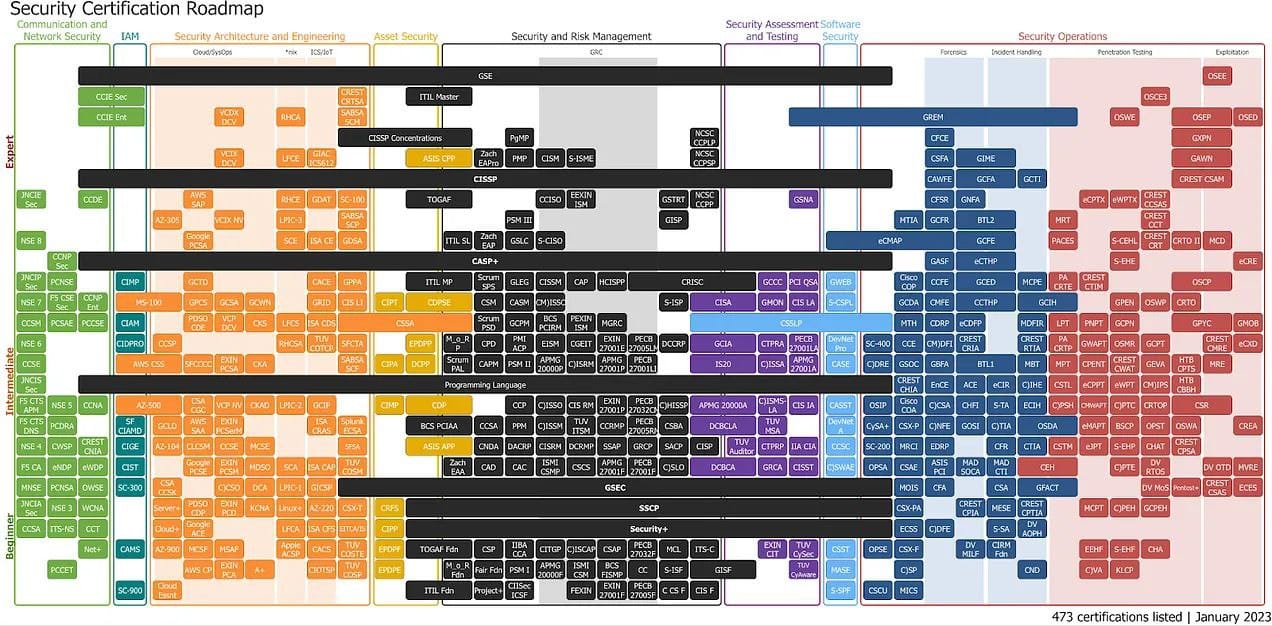CISO Certifications

As a Chief Information Security Officer (CISO), the path of certifications should progress from foundational IT and security knowledge to advanced strategic, management, and leadership-focused certifications. Here's a suggested path:
- Foundational Certifications: Start with foundational certifications such as CompTIA Security+ or SSCP to build basic security knowledge.
- Core Security Certifications: Proceed to more robust certifications like CISSP or CISM, which are recognized globally and focus on security management and operations.
- Specialized Certifications: Depending on interest and need, specialize further with certifications like Certified Ethical Hacker (CEH) for understanding offensive security or Certified Information Systems Auditor (CISA) for auditing.
- Leadership and Strategy Certifications: Embrace leadership roles with certifications like the CISSP-ISSMP (Information Systems Security Management Professional) or certifications in governance like CGEIT.
- Business and Risk Management: Enhance business acumen with certifications such as CRISC (Certified in Risk and Information Systems Control) and pursue an MBA or similar business leadership programs if relevant.
- Continued Education: Maintain certifications with CPE (Continuing Professional Education) credits and stay updated with the latest in cybersecurity through workshops, seminars, and advanced courses like those offered by SANS or other cybersecurity institutes.

Certainly, let's delve a bit deeper into the mentioned certifications:
- CompTIA Security+: This is a global certification that validates baseline cybersecurity skills. It covers essential principles for network security and risk management.
- SSCP (Systems Security Certified Practitioner): Offered by (ISC)², it's for IT administrators and managers who implement and monitor security policies.
- CISSP (Certified Information Systems Security Professional): Also from (ISC)², it's a more advanced certification. It's ideal for experienced security practitioners, managers, and executives interested in proving their knowledge across a wide array of security practices and principles.
- CISM (Certified Information Security Manager): This certification from ISACA is for management more than the technical side. It focuses on governance, risk management, and compliance.
- CEH (Certified Ethical Hacker): From EC-Council, this certification teaches how to think and act like a hacker (a legal one). It's a comprehensive ethical hacking and network security-training program.
- CISA (Certified Information Systems Auditor): This ISACA certification is for professionals who audit, control, and assure information systems.
- CISSP-ISSMP (Information Systems Security Management Professional): This is a concentration under CISSP that focuses on leadership and management.
- CGEIT (Certified in the Governance of Enterprise IT): Another ISACA certification, it's aimed at professionals managing, advising, or assuring IT governance.
- CRISC (Certified in Risk and Information Systems Control): Also from ISACA, CRISC is for IT professionals and project managers who identify and manage risks through the development of information systems controls.
- MBA (Master of Business Administration): While not a cybersecurity certification, an MBA can enhance a CISO's understanding of business principles, which is crucial for aligning security strategies with business objectives.
For a CISO, these certifications build upon each other to form a comprehensive understanding of both the technical and managerial aspects of cybersecurity. They ensure that a CISO can not only manage an organization’s security strategy but also align it with overall business goals. Each step should align with the CISO's role in the organization, focusing on strategic planning, policy development, team leadership, and risk management. The choice of certifications should also reflect the specific industry, regulatory environment, and technological landscape of the organization.





